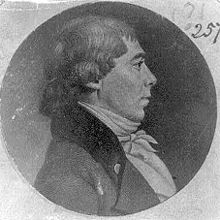David Holmes (politician)
| David Holmes | |
|---|---|
 |
|
| 5th Governor of Mississippi | |
|
In office January 7, 1826 – July 25, 1826 |
|
| Lieutenant | Gerard Brandon |
| Preceded by | Gerard Brandon |
| Succeeded by | Gerard Brandon |
|
United States Senator from Mississippi |
|
|
In office August 30, 1820 – September 25, 1825 |
|
| Preceded by | Walter Leake |
| Succeeded by | Powhatan Ellis |
| 1st Governor of Mississippi | |
|
In office December 10, 1817 – January 5, 1820 |
|
| Lieutenant | Duncan Stewart |
| Preceded by | Himself (as Governor of the Mississippi Territory |
| Succeeded by | George Poindexter |
| 4th Governor of Mississippi Territory | |
|
In office March 7, 1809 – December 10, 1817 |
|
| Appointed by | Thomas Jefferson |
| Preceded by | Robert Williams |
| Succeeded by | Himself (as Governor of the State of Mississippi) |
| Member of the U.S. House of Representatives from Virginia's 4th district |
|
|
In office March 4, 1803 – March 3, 1809 |
|
| Preceded by | Abram Trigg |
| Succeeded by | Jacob Swoope |
| Member of the U.S. House of Representatives from Virginia's 2nd district |
|
|
In office March 4, 1797 – March 3, 1803 |
|
| Preceded by | Andrew Moore |
| Succeeded by | James Stephenson |
| Personal details | |
| Born |
March 10, 1769 Hanover, Province of Pennsylvania, British America |
| Died | August 20, 1832 (aged 63) Winchester, Virginia, U.S. |
| Political party | Democratic |
| Other political affiliations |
Democratic-Republican |
| Alma mater | College of William and Mary |
David Holmes (March 10, 1769 – August 20, 1832) was an American politician. He was a Virginia congressman, and later Mississippi statesman. He was appointed as the fourth and last governor of the Mississippi Territory and became elected as the first governor of the State of Mississippi. He served a term as Senator of Mississippi, and returned to serve part of a term as governor before ill health forced him to resign.
Born in near Hanover in the Province of Pennsylvania, Holmes and his family moved to Virginia when he was a child. He served as U.S. Representative from Virginia from 1797 until 1809.
President Thomas Jefferson appointed him fourth governor of Mississippi Territory. Holmes was very popular and his appointment marked the end of a long period of factionalism within the territory. He was the last governor of the Mississippi Territory, serving 1809–17. Holmes was generally successful in dealing with a variety of matters, including expansion, land policy, Indians, the War of 1812, and the constitutional convention of 1817 (of which he was elected president).
Often concerned with problems regarding West Florida, he had a major role in 1810 in negotiations which led to the peaceful occupation of part of that territory. McCain (1967) concludes that Holmes' success was not based on brilliance, but upon kindness, unselfishness, persuasiveness, courage, honesty, diplomacy, and intelligence.
In 1817, Mississippi joined the Union as the 20th state and Holmes won the election to be the first governor of the State of Mississippi unanimously. Holmes took the oath of office in October 1817, though Mississippi did not officially become a state until December of that year. During his term, he established the state judicial system and the state militia and organized the land east of the Pearl River that the Choctaw Indians ceded.
...
Wikipedia
